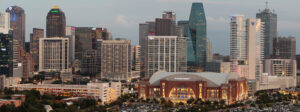By R.V. Baugus
Venue managers will tell you that they find their most sleepless nights happen when they worry about keeping their guests safe. When word came down from the National Basketball Association the night of Wednesday, March 11, that the season was being suspended due to the coronavirus outbreak, General Manager Dave Brown of the American Airlines Center in Dallas said he experienced one particular emotion: relief.
The Mavericks were playing the Denver Nuggets in what will be a historical footnote as the last game the league  played before the season took a hiatus. Brown was at the arena for the game and had an opportunity to soak in a crowd mood that started in full throttle for a game between two teams that could have met in the playoffs to one that later became aware through news feeds on telephones what was about to happen, that the game was about to take a very real back seat to a virus that would soon consume the country.
played before the season took a hiatus. Brown was at the arena for the game and had an opportunity to soak in a crowd mood that started in full throttle for a game between two teams that could have met in the playoffs to one that later became aware through news feeds on telephones what was about to happen, that the game was about to take a very real back seat to a virus that would soon consume the country.
“We couldn’t protect our guests anymore,” Brown said, noting that for the previous two to three weeks the venue had heeded best sanitation practices from the Center for Disease Control. “This had to happen for us to protect our guests. We were doing the things we were told to do and doing it to the best of our abilities but we know now that was not going to make that big a difference.
“I felt a tremendous amount of relief in terms of we don’t have to play that game anymore. We were resigned to the fact that our industry and our world was going to change. We don’t know how that’s going to play out but I feel a lot better sitting here in my office with nobody in the building than I did a week ago with 18,000 people in there that were in harm’s way because of this.”
While outside a full line of cars prepare to enter a drive-through screening process for the coronavirus, Brown shifts gears to talk about the good that can come out of this national pandemic.
“I think it’s a massive reset for our society,” he said. “I like to use the term, we’ve been so drama-driven the last few years and trying to find a little drama in every situation, good, bad, exploited one way or another. Well, we’ve got it now, and maybe folks will want a little less drama on a daily basis going forward.”
It is impossible to gauge the economic impact that the shutdown has on events at American Airlines Center, just as it is for any other venue in the country. It all depends, of course, on how long venues remain dark.
“It is devastating from the revenue side, but we didn’t cause this,” Brown said. “It’s not like we or our teams screwed up something. I think this gives us a tremendous opportunity to come out of this smarter and stronger and to be better prepared for anything like this in the future. It is such a shock to the system but I think it’s a good reset, as I said, to appreciate what we have and the good times a little bit more. When that first guest walks back in the door – whenever that is – that’s going to be the most important guest that we’ve ever hosted here.”
Had the basketball and hockey seasons played on, Brown’s team was tasked three days later on a Saturday to host a Mavs game at 1 pm and a Dallas Stars game that evening. Even with the NBA announcing the suspension, there was still thought that the league might play games with no fans in attendance. At the time, hockey was still operating as normal with fans. Dealing with both of those scenarios for that particular Saturday weighed on Brown’s mind.
“How do I do that?” Brown asked. “How do I do a closed arena at 1 o’clock and then tell all the employees and people who have to make this building ready when you have guests, OK, come in and let’s get this other show on the road. I couldn’t possibly have been able to do that. Thank goodness the NHL suspended or we would have had a real dilemma here.”
Brown is proud that the arena can help by offering the drive-through testing. He noted that American Airlines Center was not able to participate with relief during Hurricane Katrina in 2005 because “we were up and running, so Reunion Arena became a refuge and the convention center to some degree for a period of time. We couldn’t give back or do anything but this is there for us to help and make a difference to others.”
They are doing that in a way that forces Brown to hark back to his younger days in the industry.
“For logistics I’ve got to go back to my old event coordinator days,” he said. “We are coordinating with the City of Dallas and Dallas County, Parkland Hospital and the Federal government. It’s a big deal and I’ve been working on this since Mayor (Eric) Johnson reached out and asked if we would participate. We were happy we could do something during the crisis and continue to make a difference.”
